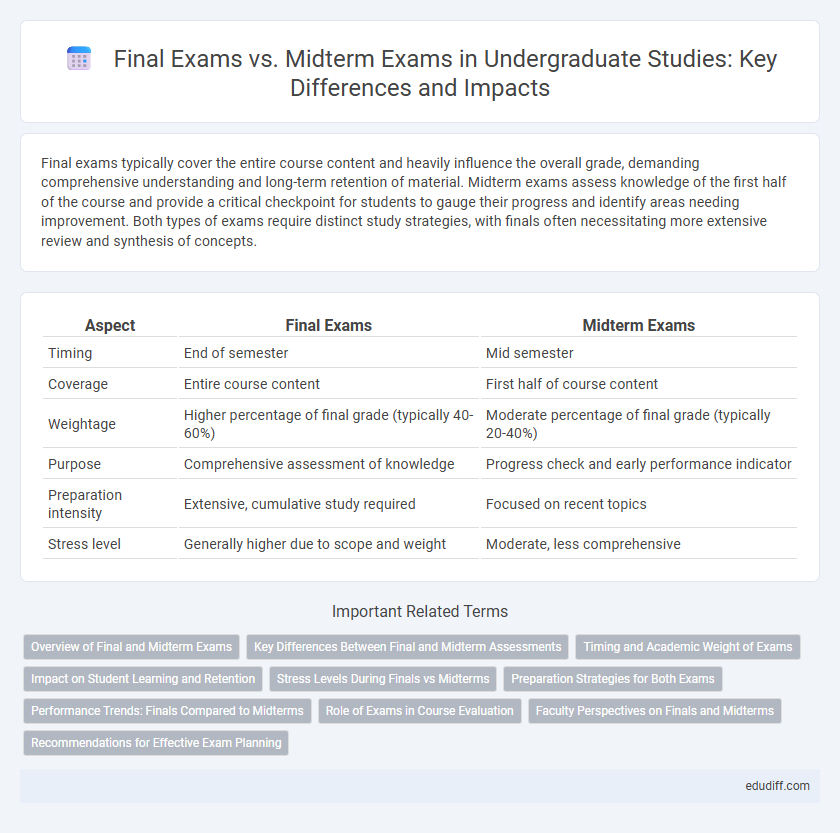Final exams typically cover the entire course content and heavily influence the overall grade, demanding comprehensive understanding and long-term retention of material. Midterm exams assess knowledge of the first half of the course and provide a critical checkpoint for students to gauge their progress and identify areas needing improvement. Both types of exams require distinct study strategies, with finals often necessitating more extensive review and synthesis of concepts.
Table of Comparison
| Aspect | Final Exams | Midterm Exams |
|---|---|---|
| Timing | End of semester | Mid semester |
| Coverage | Entire course content | First half of course content |
| Weightage | Higher percentage of final grade (typically 40-60%) | Moderate percentage of final grade (typically 20-40%) |
| Purpose | Comprehensive assessment of knowledge | Progress check and early performance indicator |
| Preparation intensity | Extensive, cumulative study required | Focused on recent topics |
| Stress level | Generally higher due to scope and weight | Moderate, less comprehensive |
Overview of Final and Midterm Exams
Final exams assess comprehensive knowledge acquired throughout the entire course, covering all units and materials studied over the semester. Midterm exams typically evaluate students' understanding of the first half of the course content, serving as a benchmark for academic progress. Both exams play critical roles in determining final grades but differ in scope, depth, and impact on overall academic performance.
Key Differences Between Final and Midterm Assessments
Final exams typically cover the entire course content and have a greater impact on the overall grade, whereas midterm exams assess knowledge from the first half of the course and generally carry less weight. Midterms provide early feedback on students' understanding, helping identify areas needing improvement before finals. Finals often include cumulative questions that test comprehensive understanding and critical thinking skills developed throughout the semester.
Timing and Academic Weight of Exams
Final exams typically occur at the end of the semester, encompassing comprehensive material covered throughout the course, while midterm exams are administered midway and assess the first half of the curriculum. The academic weight of final exams is generally higher, often accounting for 30-50% of the overall grade, whereas midterm exams usually contribute around 20-30%. Effective time management is crucial as final exams demand extensive preparation over the entire term's content, contrasting with the more focused study needed for midterms.
Impact on Student Learning and Retention
Final exams often have a significant impact on student learning and retention by encouraging comprehensive review and long-term information consolidation. Midterm exams provide timely feedback that helps identify knowledge gaps and adjust study strategies during the course. Both types of assessments contribute to different phases of learning reinforcement, with finals emphasizing cumulative understanding and midterms promoting ongoing engagement.
Stress Levels During Finals vs Midterms
Final exams typically induce higher stress levels than midterm exams due to their cumulative content and significant impact on overall GPA. Students often experience increased anxiety and sleep disturbances during final exam periods as a result of the intensified academic pressure. Effective stress management techniques and time allocation are critical to mitigating these heightened emotional challenges faced during finals.
Preparation Strategies for Both Exams
Effective preparation strategies for final exams versus midterm exams require tailored approaches due to their differing scopes and stakes. Midterm exams typically cover a portion of the course content, allowing students to focus on mastering specific modules, while final exams demand comprehensive review and synthesis of the entire semester's material. Utilizing distributed practice, creating detailed study guides, and engaging in active recall are essential techniques to enhance retention and performance in both midterm and final assessments.
Performance Trends: Finals Compared to Midterms
Performance trends in undergraduate courses often show a notable improvement in final exam scores compared to midterm exams, reflecting students' enhanced understanding and increased study efforts as the semester progresses. Data from university assessments indicate an average score increase of 8-12% from midterms to finals, highlighting the impact of cumulative learning and targeted revision strategies. This trend underscores the importance of ongoing academic support and adaptive learning resources to optimize student outcomes throughout the course.
Role of Exams in Course Evaluation
Final exams play a critical role in undergraduate course evaluation by assessing comprehensive knowledge gained throughout the semester, often carrying a higher weight in the overall grade. Midterm exams evaluate students' understanding of the material covered in the initial half of the course, providing both students and instructors with insights into learning progress and potential knowledge gaps. Together, midterm and final exams form integral components of continuous assessment, ensuring balanced measurement of students' academic performance.
Faculty Perspectives on Finals and Midterms
Faculty often view final exams as a comprehensive assessment of a student's understanding accumulated throughout the semester, whereas midterm exams typically evaluate progress on initial course concepts. Many professors emphasize finals for their ability to synthesize learning and measure critical analysis skills, while midterms are considered checkpoints that inform instructional adjustments. The preference for final exams is linked to their role in determining overall academic performance, as reflected in grading policies and curriculum standards.
Recommendations for Effective Exam Planning
Effective exam planning requires allocating more study time for final exams due to their comprehensive nature compared to midterm exams, which typically cover less material. Creating a detailed study schedule that breaks down topics for both exam types enhances retention and reduces last-minute cramming. Utilizing past papers and practice questions tailored to each exam format improves familiarity with question styles and time management skills.
Final exams vs Midterm exams Infographic

 edudiff.com
edudiff.com